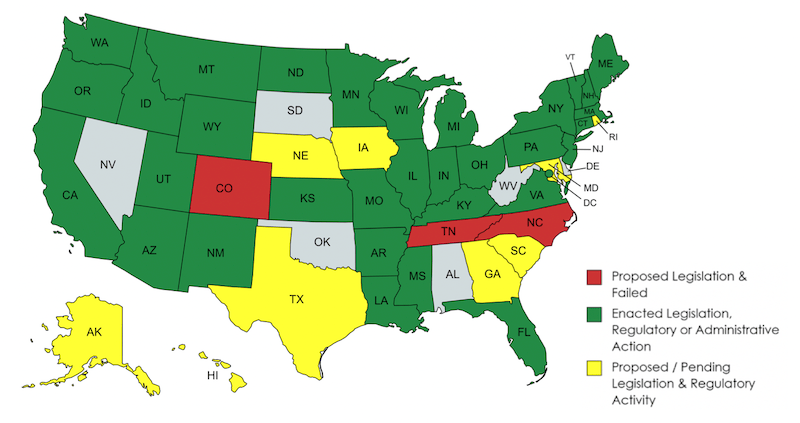Workers’ compensation (WC) policies do not cover “ordinary diseases of life” such as a cold or the flu because their origin of transmission cannot be definitively linked to the workplace. But is COVID-19 an ordinary disease, or an occupational one? It’s a critical question because it largely determines whether a COVID-related WC claim is compensable.
Compensability of COVID Claims Under Workers’ Compensation
Without guidance from the federal government on the ordinary versus occupational disease question, states are coming up with their own answer. Thus far, 41 states have pending or enacted legislation, regulatory measures, or administrative policies which affirm the presumption that COVID is an occupational disease and is therefore compensable.

Presumption of compensability for COVID-related WC claims, as of April 2021.
Sources: National Council on Compensation Insurance, National Conference of State Legislature
This presumption of compensability makes it easier for claimants who contract COVID to qualify for WC benefits. Without it, the burden would fall on the claimant to persuade a judge that he or she contracted COVID through the course of their work. With it, claimants do not necessarily have to pinpoint a specific workplace incident where they contracted it.
Specific state policies vary. In an extreme example, California established compensability for all workers who test positive for COVID and who are not exclusively working from home. While few states have gone this far, many have made it easier for different classes of employees to automatically qualify for benefits under the presumption of compensability standard.
For instance, in some states healthcare workers, first responders, transportation workers, food service and delivery workers, front-line workers, and “other workers with direct dealings with the public” are identified as eligible classes.
COVID-Related WC Claims for Uninsured Contractors
The presumption of compensability for COVID claims benefits any employee or independent contractor who is appropriately covered by a WC policy. The risk is that an uninsured contractor falls ill to COVID and seeks to be reclassified as an employee of the contracting entity to cover their medical bills and lost wages.
These costs can be significant. An analysis of COVID-related WC claims in 41 states found that:
- 20% of claimants were hospitalized for one week, at an average cost of approximately $40,000
- If hospitalized in intensive care, the average length of stay increased to 12 days with costs in excess of $62,000
- The other 80% of claims were for limited treatment plus lost wages during recovery or quarantine
In addition to these direct costs, companies facing reclassification cases incur legal expenses and can be referred by courts to the IRS and Department of Labor for further scrutiny.
These costs and risks would of course be avoided if contractors secured their own WC policy. An insured contractor who falls ill to COVID would have no reason to seek reclassification from the contracting entity to cover their medical bills and lost wages. From a risk mitigation standpoint, this is why it is critical to ensure that all contractors have a WC policy in their name.
The 1099Policy platform makes it easy for contracting entities and labor platforms to ensure that contractors have a WC policy in place for the duration of their assignment. To learn more, contact us.